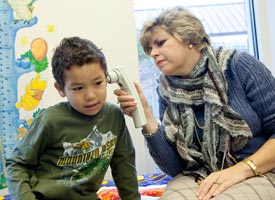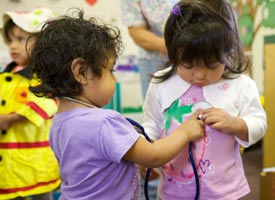The first five years of life are a time of rapid growth that varies a little for every child. Teachers use assessments to get a clear picture of a child's development, but health factors can influence these results.
"Observing, gathering, and recording information on children's learning for the purpose of evaluating their progress and making teaching decisions (Head Start National Center on Quality Teaching and Learning, 2014)."
A Child's Health Can Affect Performance on Assessments
Child health status includes physical, nutritional, oral, and mental health.
A child's health status may affect his or her ability to perform well on assessments. The health and wellness of a child's family can also influence his or her performance. A hungry or tired child may not be able to focus on the task being assessed.
Health Factors to Consider When Conducting Ongoing Child Assessment
"Assessment procedures are designed to accurately reflect child status and need, using materials and procedures that accommodate sensory, physical, and temperamental differences (Division of Early Childhood, 2007)."
Ongoing child assessment, both formal and informal, offers many chances to define progress. Program assessment schedules may take children's health status into account to help get an accurate picture of each child. When analyzing results, note health concerns that may affect a child's performance. By using all of this information, educators can see the "whole child."
 To plan assessment or interpret child assessment results better, ask the following questions:
To plan assessment or interpret child assessment results better, ask the following questions:
Minor illness. Does the child have a temporary illness that makes it hard for him or her to concentrate? Illnesses may include cold, flu, or ear infections.
Chronic illness. Is the child dealing with a chronic illness that makes it hard for him or her to function? Examples are asthma, allergies, and diabetes.
Oral health. Is the child experiencing mouth pain that could cause distractions? Could pain be causing other changes in the child's behavior?
Nutrition. Has the child eaten a healthy meal, and does he or she have the energy necessary to perform well?
Physical activity. Does the child's energy level affect his or her ability to engage in activities? Children can show signs of hyperactivity or listlessness that make them hard to assess.
Sleep. Has the child had enough sleep to participate in activities and demonstrate skills?
Disability. Does the child have a disability that requires adaptations to how the assessment is delivered? Many children have adaptations in their IEP or IFSP.1
Self-regulation. Can the child control his or her emotions well enough to focus on activities?
Prosocial behavior. Is the child able to listen and follow directions?
Nurturing and responsive relationships. Is the child comfortable with the adults who are assessing him or her?
Mental health. Does the child have social or emotional challenges that may make him or her hard to assess? If a child has constant temper tantrums, he or she may not be able to join classroom lessons and may miss out on learning.
Crisis management. Has a crisis occurred recently that might be distracting?
Safe and secure environments. Does the child feel safe enough to take risks and demonstrate what he or she knows?
Health literacy. Do family members know what they need to do to keep the child healthy and engaged in school activities? Is health information available in a language they can understand?
Tools to Improve School Readiness Assessment Strategies
Everyday Activities
- The Daily Health Check offers important information about whether a child has eaten or slept or feels ill. This "first look" can help determine whether to reschedule assessments to get the best picture of the child.
- Arrival and dismissal communication systems provide educators and families with child health information that can be used to schedule assessments.
- Regular safety checks keep the environment safe and allow children to perform their best.
Collecting and Using Data
-
Staff schedule assessments when children are most comfortable, conducted by people they know. This may mean scheduling assessments in the middle of the week with their everyday teachers.
- Staff consider child health status when analyzing child outcome data. Knowing how a child's health affects results helps offer context.
- Staff use record keeping and reporting systems to look at data from child assessments and child health together. This broader analysis helps them understand the whole child. They can learn which strategies work with each child and which need improvement.
Building Partnerships
- Ongoing contact with each child's medical or dental provider helps programs manage concerns. This may include minor and chronic illnesses, pain, and medication effects.
- The mental health consultant and the disabilities services partners guide staff who assess children. They help meet requirements in a child's IEP or IFSP.
- The Health Services Advisory Committee (HSAC) can help find resources for children who need support. The HSAC can also help the program respond to community health issues.
- Positive ongoing relationships between staff and families give children the comfort they need to do their best.
- Staff work with families to include health and safety goals in the Family Partnership Agreement. These goals promote children's health so that they can engage in assessments effectively. Goals can also help families cope with crises, reduce stress, and create healthy environments.
References
Head Start National Center on Quality Teaching and Learning. Tips for Teachers. Ongoing Child Assessment: Overview. Assessment Glossary. [PDF, 82KB]. Posted spring 2014. Accessed March 20, 2017.
Division for Early Childhood of the Council for Exceptional Children. (2007). Promoting Positive Outcomes for Children with Disabilities: Recommendations for Curriculum, Assessment, and Program Evaluation. Missoula, MT: Division for Early Childhood. https://www.naeyc.org/files/naeyc/file/positions/PrmtgPositiveOutcomes.pdf [PDF, 313KB]. Posted March 2007. Accessed March 20, 2017.
1 An IEP is an Individualized Education Program for preschool-aged and older students served under Section 619 of Part B of the Individuals with Disabilities Education Act (IDEA). An IFSP is an Individualized Family Service Plan for infants and toddlers served under Part C of IDEA.
Last Updated: September 25, 2023


